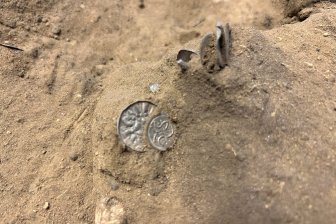Faux Drake controversy is simply the beginning of what AI will deliver to music – Nationwide
[ad_1]
Probably the most talked-about tune of the month to date hasn’t been the Foo Fighters’ new single or something from Taylor Swift however a monitor that featured the vocals of each Drake and The Weeknd whereas concurrently that includes nothing from both artist.
When you’re confused, simply wait.
Learn extra:
Music generated by synthetic intelligence is coming to the radio earlier than you assume
Coronary heart on My Sleeve was a creation of somebody named Ghostwriter977 who used synthetic intelligence to imitate the vocal types of each performers. The end result was a model new tune born out of software program that actually does sound like Drake and The Weeknd spent the weekend in a studio collectively.
Ghostwriter977 posted the monitor on all of the streaming music companies (Spotify, Apple Music, YouTube, Amazon, SoundCloud, Tidal, and Deezer) and noticed it performed and seen a whole lot of 1000’s of occasions. A TikTok put up was streamed 15 million occasions. One Twitter put up acquired 20 million clicks.
Common Music, the house label of each Drake and The Weeknd, complained very loudly and Coronary heart on My Sleeve was taken down. However as a result of the web is endlessly, you will discover it with a fast Google search. Common condemned the apply of utilizing actual songs by actual artists to coach AI to create new and totally different songs, calling this “each a breach of our agreements and a violation of copyright legislation.” The label additionally took a shot at streaming music companies, saying that they’ve “authorized and moral duty to stop the usage of their companies in ways in which hurt artists.”

There’s a lot to unpack with this case.
Drake and The Weeknd aren’t the one acts to search out pretend variations of themselves on-line. Rihanna, Jay-Z, Kanye West, Ariana Grande, and Eminem are simply three different artists who’ve been cloned utilizing generative AI. Think about being despatched a hyperlink to a tune the place that’s you however not you. Would you’re feeling violated and ripped off?
Within the case of a Girl Gaga/Lana Del Rey creation, each singers gave their blessing and apparently love the outcomes. It’s unclear in the event that they’re being compensated.
The authorized questions surrounding these pretend songs have been effervescent up for the final couple of years.
First, copyright legislation is murky in terms of these new AI songs. Neither Drake nor The Weeknd wrote or sang the tune. They’d nothing to do with it and don’t have any compositional or efficiency declare. The whole lot about Coronary heart on My Sleeve was created by a machine with none enter from them. The ultimate product simply occurs to sound eerily acquainted. It’s additionally disturbing that the subject of the tune is Selena Gomez, who as soon as dated The Weeknd. The voices on the tune commerce verses about her.
Since many territories (together with Canada) solely contemplate music created by a human copyrightable, the authorized implications are unclear. There are not any legal guidelines particular to AI creations (though the EU is engaged on it). As the one that programmed the AI, does Ghostwriter977 have a declare to possession of the tune? It’s doable, relying on the way you interpret the legal guidelines. For instance, you may argue that Coronary heart on My Sleeve was a collaboration between human and machine. Then there’s one thing referred to as “transformative parody” is acknowledged as authorized. However what precisely is supposed by “transformative?” The authorized system has but to be examined on that.
One other difficulty has to do with picture and likeness. Up till now, third events have needed to be very cautious when appropriating traits of somebody for makes use of for which permission has not been granted. Think about how you’d really feel in the event you discovered some digital model of your self, one which appeared and sounded such as you however was doing stuff you’d by no means do and saying issues that you just’d by no means say? And in case your on-line clone says one thing libellous or defamatory, who will reply for that?
Different artists corresponding to Brian Eno, Peter Gabriel, and David Guetta are bullish concerning the prospects of AI getting used for the inventive good. Guetta has gone as far as to say the way forward for music is in AI. They usually may be appropriate if sure precedent is taken into account.
Again within the very late Nineteen Seventies and early ’80s, know-how made it doable for artists to deconstruct songs into samples which had been then reassembled into new songs. Sampling grew to become a vital creation software and after a interval of authorized ambiguity is now an accepted a part of music composition. When you comply with the foundations and procedures and pay to be used of the pattern, no drawback.
Sampling gave start to one thing referred to as an “interpolation” the place an older tune is included into the muse of one thing model new. A wonderful instance of an interpolation is the usage of Rick James’ 1981 tune Superfreak. It was recycled in a artful approach for MC Hammer’s U Can’t Contact This (1990) and extra just lately for Tremendous Freaky Woman by Nicki Minaj (2022). The rightsholders of Superfreak (which is now the Hipgnosis Track Fund) obtain revenues from these interpolations.
Samples and interpolations are settled legislation. Might the identical occur with AI? I’d wager on it.
Say you might have a very nice singing or talking voice. Chances are you’ll quickly be capable to license your voiceprint to an organization that will then use it to do voiceovers and narrations. Such corporations exist already. This results in the opportunity of Morgan Freeman narrating documentaries about penguins for the subsequent 100 years.
Or we may see extra tasks like this. A British band referred to as Breezer was uninterested in all the guarantees of an Oasis reunion in order that they enlisted AI to create the subsequent smartest thing. They found out the way to create one thing akin to what the actual Oasis gave the impression of between 1994 and 1996 and the outcomes are glorious. Even Liam Gallagher approves: “It’s higher than all the opposite snizzle on the market. I sound mega.”
You simply know somebody is engaged on a Beatles reunion album proper now. Good or dangerous? Nicely, if licensing AI tasks may be labored out, there could possibly be some huge cash to be made, identical to artists are earning profits from samples and interpolations.
However let’s get barely dystopian once more. If anybody can use AI to jot down a tune, it’s probably within the close to future that streaming music companies shall be flooded with new tracks written by machines with the assistance of a human programmer. The variety of songs within the streamers’ library will leap from the present 100 million-ish to one thing maybe exponentially a lot, a lot greater, making it tougher for everybody to rise above the noise.
Nonetheless, a few of these songs will grow to be hits. What then? Will document labels set up AI departments for the expressed goal of making and selling synthetic stars? You wager. Income-generating music with out having to cope with pesky musicians and all of the overhead that goes together with them. It will give start to a brand new technology of creatives who make music with out studying the way to play a single notice. Once more, good or dangerous? We’ll see.
Learn extra:
The robots are coming to take over the airwaves. Subsequent goal — the trusted radio announcer
It’s getting simpler to coach AI, too. You feed it music — say, from Spotify — and this system analyzes the tens of millions of knowledge factors throughout the tune. From there, it could possibly synthesize one thing new incorporating the traits of what it heard. Google even has a new AI that may write a tune for you primarily based on directions given by nothing greater than textual content. Very quickly, we’ll be capable to kind in one thing like “Write a tune that riffs like Metallica however has a vocal like Madonna.” Growth. Performed.
This goes far past simply music, too. Any type of inventive work can be utilized to coach an AI from pictures to writing. There’s a undertaking referred to as Have I Been Skilled that enables customers to determine of somebody has used their copyrighted work for AI functions with out permission. Count on extra of this kind of policing.
Google CEO Sundar Pachai appeared on 60 Minutes earlier this month. He believes that AI will finally be as vital to the human race as fireplace and electrical energy. He additionally believes that the time to start out creating guidelines and legal guidelines is now. Firms, organizations, and governments should come collectively to make sure that the quantity of evil completed utilizing AI is saved to a minimal.

In the meantime, AI will solely grow to be extra refined and can take the place of increasingly people. Who would be the first to expertise disruption? Artists. Sure varieties of writers. Folks in data industries. Artistic varieties. After all, new jobs will come up because of AI. Hey, there are already openings for a brand new gig referred to as “AI prompter.”
When you had been round within the mid-90s when this new factor referred to as the “web” was beginning to grow to be common, you may bear in mind considering “That is cool. It’s going to alter a variety of issues.” However even the wildest imaginations couldn’t have predicted how the web has managed to reshape humanity in such a brief time period.
I’ve received the identical feeling about AI. It may really open up new frontiers in music. However for the whole lot else, I’m not practically as optimistic.
—
Alan Cross is a broadcaster with Q107 and 102.1 the Edge and a commentator for International Information.
Subscribe to Alan’s Ongoing Historical past of New Music Podcast now on Apple Podcast or Google Play
[ad_2]



No Comment! Be the first one.